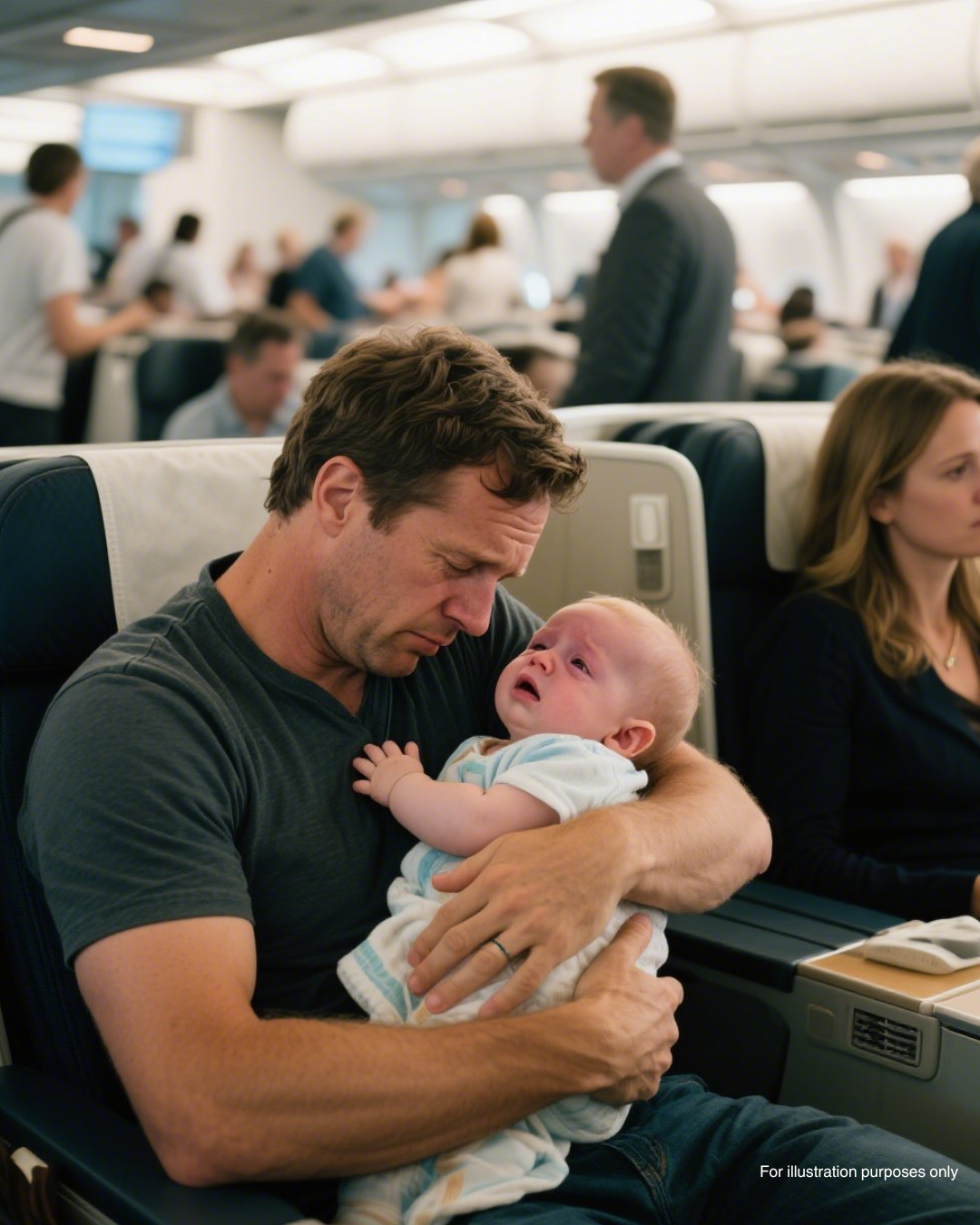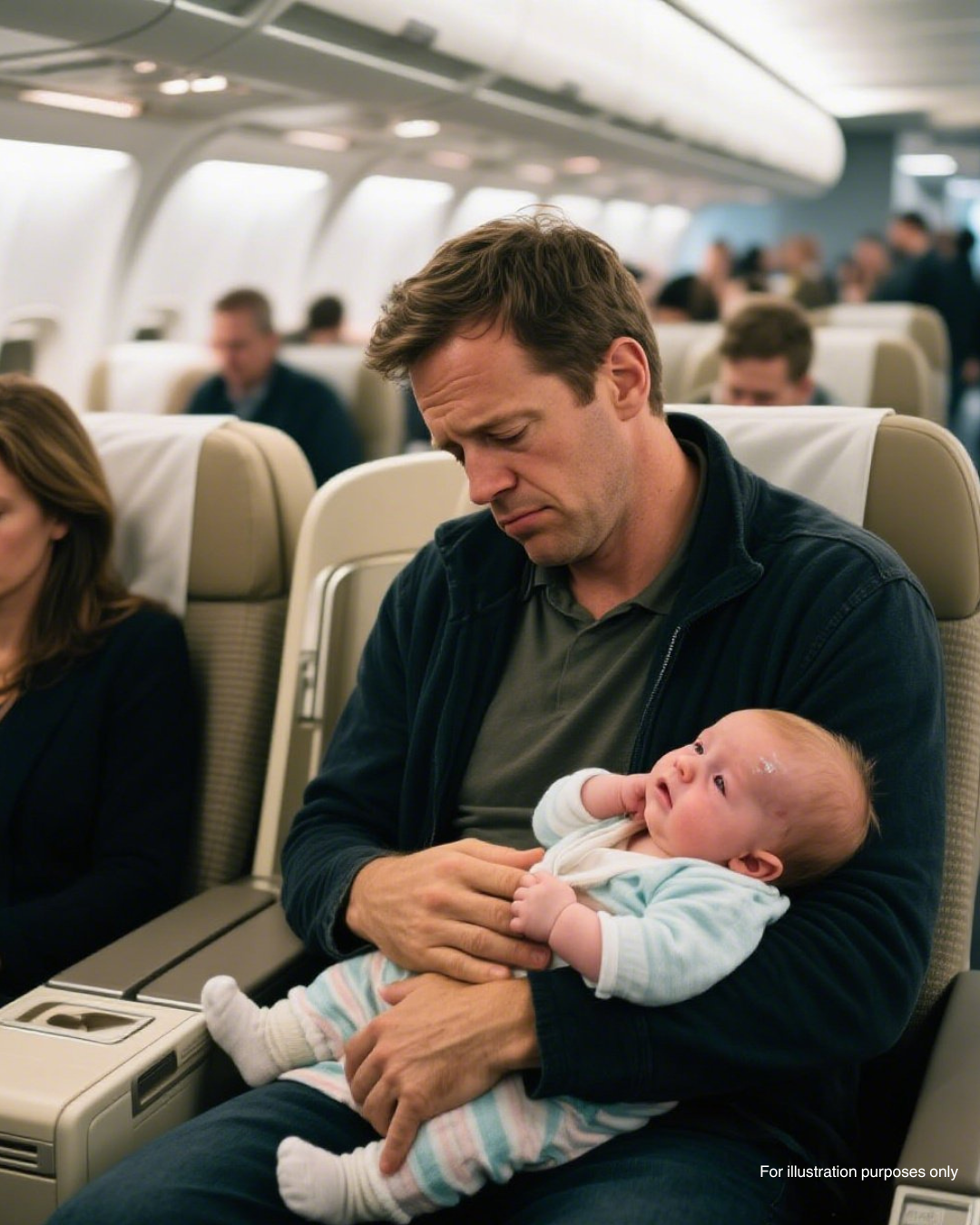The airport was plunged into chaos. It lived its own wild life — loud announcements, confusing flight boards, children’s cries, anxious glances at watches, nervous footsteps on the tile floor. All of it created a dense background noise where human voices got lost. Hustle, irritation, fatigue, and hope — everything mixed into one ringing air, as if everyone here carried their own burden but no one had the strength to share it with another.

Amid this crowd stood Jeffrey Lewis, a thirty-four-year-old man who looked older than his years. He was alone. Not because he didn’t want to be with someone, but because circumstances had made him the sole support for the tiny little person pressed against his chest. His son Sean, an eleven-month-old baby with rosy cheeks and warm breath, was asleep but even in sleep seemed uneasy. The fever hadn’t gone down for more than a day. During this time, Jeffrey had missed two flights, stuck in New York after difficult days — days of saying goodbye to a father he had never fully forgiven.
Now he stood at gate B14, as if just around the corner of the corridor lay the road home. But the ticket in his pocket felt like it weighed a ton. Boarding was delayed. Another delay. And again — waiting. He watched other parents, families, those simply traveling, and felt his exhausted body struggle with the urge to sit down and give up. But he couldn’t. He had to return. To Seattle. To the doctor. To Sean’s crib. To the life that went on no matter what.
“Jeffrey Lewis?”
He turned. A young airline employee stood before him, composed but with a shadow of fatigue in her eyes. She spoke softly, almost sympathetically:
“We have one seat left.”
“One?” he could hardly believe his ears.
“Only one,” she nodded. “We understand the situation is difficult. But we can seat you now. If you agree.”
Jeffrey lowered his eyes to his son. The baby was breathing rapidly, his skin burning through his clothes. Something inside him snapped. He had to make a decision: fly alone and leave the child here? Impossible. He couldn’t do that. But not taking him — also impossible. This was no choice, but a necessity.
“I’m ready,” he said, his voice trembling. “Will I have to hold the baby in my arms?”
“Yes. But if you agree — we’ll take you on board.”
“Thank you…” he exhaled, only now realizing how long it had been since he last cried. Now tears began to rise, but he held them back. Not the time.
When they boarded the plane, the world around grew a little quieter. Passengers were already taking their seats, some reading, some listening to music, some just closing their eyes. Jeffrey carefully made his way between the seats, softly humming a lullaby to calm Sean a little. He felt every movement of the baby, every twitch, every breath. He knew this was his responsibility. His duty. His love.
“28B. The very back,” the flight attendant informed him, glancing briefly at his ticket.
He began to sit down when suddenly he heard a voice:
“Excuse me.”
It was a woman. Elegant, confident. From first class. Tall, with straight shoulders, in a formal suit, but with soft, attentive eyes.
“Is this your seat?” she asked the stewardess.
“No, ma’am, he’s in economy.”
The woman turned to Jeffrey:
“Sir, you and your baby wouldn’t like to move here?”
He froze. He hadn’t expected that. Didn’t understand why.
“I… I can’t. You bought this seat…”
She smiled. Not contemptuously, not condescendingly — warmly. Like someone who remembered what it meant to be in need.
“Yes. That’s why I want to give it to you.”
The stewardess hesitated, but the woman simply raised her hand:

“I insist.”
A moment. Time slowed. Everyone around seemed to notice this moment. The businessman opposite put aside his tablet. A student took out her headphones. A child in the next row stuck his head between the seatbacks. Even the stewardess nodded: let it be so.
Jeffrey slowly settled into the soft first-class seat. Carefully adjusted Sean, checked if he was comfortable. The woman took his crumpled boarding pass and, without a word, headed to the exit. She left as those do who know the value of kindness and ask for no thanks.
Three hours later, they landed in Seattle. Jeffrey looked for her among the crowd, but she was gone. Vanished. As if she had never existed. But her act remained inside him — deep, like a seed that sooner or later would sprout.
A week passed. The mailbox brought an envelope without a return address. Inside — just one card, neatly handwritten:
“When my daughter was two years old, a stranger gave up her first-class seat so I could feed her peacefully. That gesture changed my outlook on life. Pass kindness on. Always — L.”
Jeffrey stared at these words for a long time. Silent tears ran down his cheeks. He understood that kindness was not just a coincidence. It was a chain. A circle. And he was part of its movement.
Two years passed.
Sean no longer stayed silent like he did on the plane. He babbled endlessly, pointed at clouds, told stories he made up on the fly. They were flying again. But now Jeffrey held a first-class ticket in his hands — not because he had become richer, but because he decided that some things were more important than money.
At the boarding gate, he saw a young mother. With a stroller, a bag over her shoulder, a crying infant in her arms, and dark circles under her eyes. She looked as if she hadn’t rested for days. Perhaps, like him once, she too was returning home where awaited not only a child but unbearable fatigue.
Jeffrey approached, gently touched her shoulder:
“Hello. Would you like to take my seat?”
She looked at him with wide eyes:
“Really?”
He nodded.
“Someone once did this for me. Pass kindness on.”
And so, from one person to another, kindness continued its journey — endlessly, silently, but inevitably.
